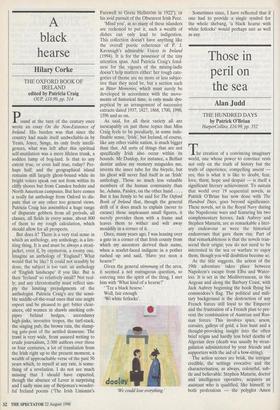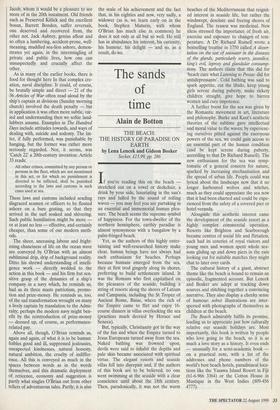Those in peril on the sea
Alan Judd
THE HUNDRED DAYS by Patrick O'Brian HarperCollins, £16.99, pp. 352 The creation of a convincing imaginary world, one whose power to convince rests not only on the truth of history but the truth of experience, compelling assent yes, this is what it is like to doubt, fear, love, thirst, hope and despair — is itself a significant literary achievement. To sustain that world over 19 sequential novels, as Patrick O'Brian has now done with The Hundred Days, goes beyond significance. These novels, set in the Royal Navy during the Napoleonic wars and featuring his two complementary heroes, Jack Aubrey and Stephen Maturin, are as remarkable a liter- ary endeavour as were the historical endeavours that gave them rise. Part of that remarkableness is that the novels tran- scend their origin; you do not need to be interested in the sea or warfare to enjoy them, though you will doubtless become so.
As the title suggests, the action of the 19th adventure takes place between Napoleon's escape from Elba and Water- loo. It is set in the Mediterranean, in the Aegean and along the Barbary Coast, with Jack Aubrey beginning the book flying his commodore's flag. The political and mili- tary background is the destruction of any French forces still loyal to the Emperor and the frustration of a French plan to pre- vent the combination of Austrian and Rus- sian forces. This involves spies, arson, corsairs, galleys of gold, a lion hunt and a thought-provoking insight into the often brief reigns and hardly less brief deaths of Algerian deys (death was usually by stran- gulation administered by your friends and supporters with the aid of a bow-string).
The action scenes are brisk, the intrigue credible, the settings evocative and the characterisation, as always, colourful, sub- tle and believable. Stephen Maturin, doctor and intelligence operative, acquires an assistant who is qualified, like himself, in both professions — the polyglot Amos Jacob, whom it would be a pleasure to see more of in the 20th instalment. Old friends such as Preserved Killick and the excellent bosun, Barrett Bonden, suffer reversals, one deserved and recovered from, the other not. Jack Aubrey, genius afloat and so often a lumbering, accident-prone, well- meaning, muddled sea-lion ashore, demon- strates yet again, in the intermingling of private and public lives, how one can unsuspectedly and crucially affect the other.
As in many of the earlier books, there is food for thought here In that complex cre- ation, naval discipline. It could, of course, be brutally simple and direct — 21 of the 36 Articles of War often read aloud by the ship's captain at divisions (Sunday morning church) involved the death penalty — but in application it was often more subtle, var- ied and understanding then we softie land- lubbers assume. Examples in The Hundred Days include attitudes towards, and ways of dealing with, suicide and sodomy. The lat- ter, if fully performed, was punishable by hanging, but the former was rather more seriously regarded. Nor, it seems, was `Catch 22' a 20th-century invention: Article 33 reads:
All other crimes, committed by any person or persons in the fleet, which are not mentioned in this act, or for which no punishment is directed to be inflicted, shall be punished according to the laws and customs in such cases used at sea.
These laws and customs included sending disgraced seamen or officers to be floated ashore on a bare grating, so that they arrived in the surf soaked and shivering. Such public humiliation might be more or at least no less — effective, and certainly cheaper, than some of our modern meth- ods.
The sheer, unceasing labour and fright- ening chanciness of life on the ocean wave are conveyed by O'Brian with an almost subliminal drip, drip of background reality. Ditto his shrewd understanding of intelli- gence work — directly wedded to the action in this book — and his firm but sen- sitive grasp of the dynamics of a ship's company in a navy which, he reminds us, had as its three masts patriotism, promo- tion and prize-money. He reminds us, too, of the sad transformation wrought on many a lively captain by translation to the Admi- ralty; perhaps the modern navy might ben- efit by the reintroduction of prize-money — dressed up, of course, as performance- related pay.
Above all, though, O'Brian reminds us, again and again, of what it is to be human: foibles good and ill, suppressed jealousies, unexpected kindnesses, natural honesty, natural ambition, the cruelty of indiffer- ence. All this is conveyed as much in the spaces between words as in the words themselves, and this dramatic deployment of reticence, economy and suggestion is partly what singles O'Brian out from other tellers of adventurous tales. Partly; it is also the scale of his achievement and the fact that, in his eighties and now, very sadly, a widower (as is, we learn early on in the book, Stephen Maturin, with whom O'Brian has much else in common) he does it not only at all but so well. He still has in abundance his interest, his curiosity, his humour, his delight — and so, as a result, do we.

























































 Previous page
Previous page